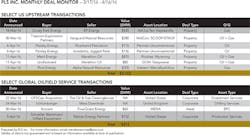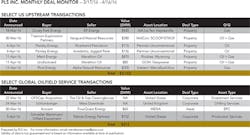Is the deal market signaling a turning point with heightened activity?
BRIAN LIDSKY, PLS INC., HOUSTON
AS MENTIONED in last month's Deal Monitor column, PLS Inc. wrote that our indicators signaled an increasing decline in US oil production. We stated "we are biased to advising our clients to be buyers, now."
Now, our M&A data suggest that players in the upstream M&A markets are growing more active. In the US, we tallied 27 deals during this period for $2.7 billion versus 23 deals for $1.5 billion the prior month. A major driver for deal market recovery is growing confidence among both buyers and sellers that oil prices may well have marked their low point. From peak to trough, WTI spot went from $105.68/bbl on July 28, 2014, to a low of $26.19/bbl on Feb. 11, 2016. As of this writing on April 25, 2016, oil prices are up 63% from the February low.
After more than 18 months of declining oil prices, the fundamental supply/demand landscape is much healthier. With fears of new lows for oil prices waning, buyers are under some pressure to strike quickly while bargains are still to be had.
A theme gaining momentum is private E&Ps as major buyers. This month, Merit Energy struck the largest deal, paying $870 million for all of Marathon's Wyoming oil and gas assets. Marathon has long been a leading oil producer in Wyoming, and PLS analysis indicates Marathon sold 16,500 boe/d at $34,000 per daily boe (96% oil) after allocating $303 million to the Red Butte pipeline.
In the second-largest deal, Denham Capital-sponsored Covey Park Energy agreed to pay $420 million for all of EP Energy's Haynesville and Bossier assets located mainly in north Louisiana's DeSoto and Bossier parishes. The deal brings Covey Park 113 MMcf/d of gas at a price of $3,000 per daily Mcf (205 Bcf of proved developed) and 190 gross locations on 34,167 net acres (33% HBP) at a price of $2,400 per acre.
In addition to the theme of private companies striking on the buyside, the Permian and SCOOP/STACK remain highly desirable plays that are economic even at low prices. Parsley Energy announced four separate deals this month for a total of $359 million. Sellers include Riverbend Permian, Anadarko, Jagged Peak, Legacy Reserves, and an undisclosed party. Parsley was able to pick up core acreage at prices ranging from $9,800 to $24,000 per acre and quickly raised the capital via an equity offering that ultimately got upsized from 16 million shares to 18.25 million shares (raising $391 million).
In the SCOOP/STACK play of Oklahoma, Titanium Exploration Partners paid $280 million for $9,200 per daily boe and $6,200 per net acre. Single-well IRRs in the deal yield 40-46% based on $40 oil, $2.50 gas, and $14 NGLs.
While the deal markets are picking up, the down cycle has been long and harsh and ultimately too much for some companies to manage. This month witnessed Chapter 11 filings from two well-known companies. First Energy XXI filed on April 14 after a hard-fought negotiation with creditors on a Restructuring Support Agreement. If all goes well, Energy XXI expects the RSA to be effective and commence Sept. 2. The next day, Goodrich Petroleum filed Chapter 11 to also implement an RSA with a target date of June 9-15 to emerge. Under Goodrich's plan, RBL and Sr. Secured claims will be paid 100% while Second Lien claims will be paid 6%.
On the positive side, Swift Energy, which filed Chapter 11 on Dec. 31, emerged from bankruptcy on April 22 to implement its reorganization plan.
The international deal markets, however, are not responding as quickly as the United States to an upswing in oil prices. PLS logged 15 deals this month versus 25 the prior month. The largest deal is a $395 million buy by an affiliate of China's Geo-Jade Corporation for the takeover of Calgary-based Bankers Petroleum. The deal was struck at 109% premium to the average price of Bankers over the prior 30-day period and brings 19,400 bbl/d of production located in Albania.
In Canada, the markets also remain slow. In the largest deal, Penn West Petroleum sold non-core Slave Point assets producing 3,900 boe per day (97% liquids) for $114 million to an undisclosed buyer. The deal implies a multiple of 7.0 years based on Edmonton Par pricing of C$40/bbl in Q1 2016 and C$50/bbl for the balance of 2016.
Outside of the upstream sector, the largest deal by far is TransCanada's transformational $13.0 billion acquisition of Columbia Pipeline Group at an 11% premium to Columbia's prior-day closing price and a 32% premium to Columbia's prior 30-day volume weighted average price. The deal adds a premium natural gas pipeline network of nearly 15,000 miles of interstate natural gas pipelines to connect growing Marcellus and Utica supplies as well as a direct line that can be reversed to deliver supplies to the Louisiana Gulf Coast and LNG exports. With Columbia, TransCanada has one of North America's largest natural gas transmission businesses.


